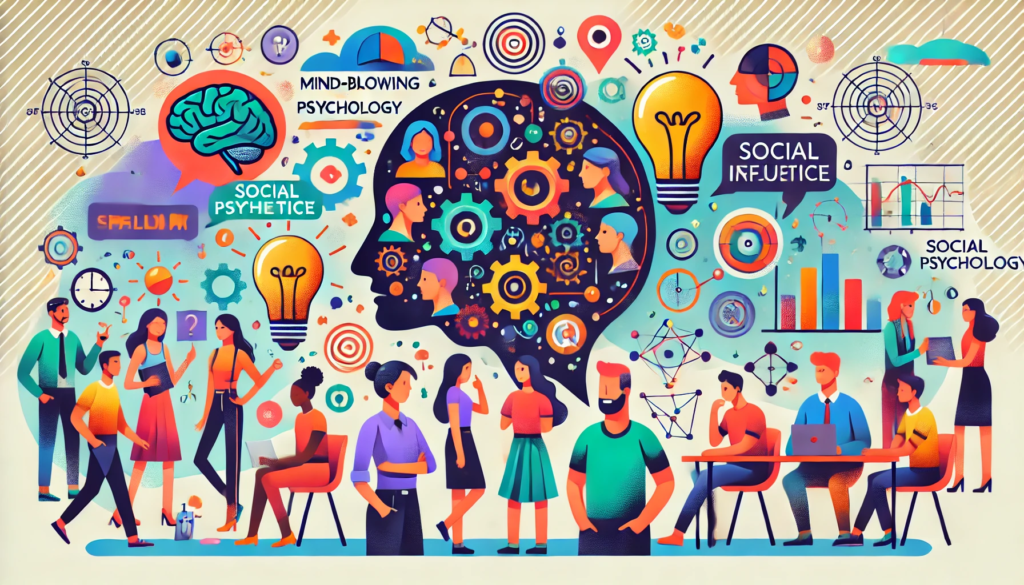
Social psychology is a fascinating field that explores how people’s thoughts, feelings, and behaviors are influenced by the presence of others. From understanding group dynamics to the power of social influence, social psychology offers insights that can change how we view ourselves and the world around us. Here are ten mind-blowing facts about social psychology that will leave you thinking differently about human behavior.
Table of Contents
- 0.1 1. The Power of Conformity: We Often Follow the Crowd
- 0.2 2. The Bystander Effect: Why People Don’t Help in Emergencies
- 0.3 3. Cognitive Dissonance: The Mental Discomfort of Conflicting Beliefs
- 0.4 4. The Halo Effect: First Impressions Matter More Than You Think
- 0.5 5. Social Loafing: Why Group Work Can Be Less Effective
- 0.6 6. The Pygmalion Effect: Expectations Shape Reality
- 0.7 7. Groupthink: The Danger of Consensus Over Critical Thinking
- 0.8 8. Self-Fulfilling Prophecies: How Beliefs Can Create Reality
- 0.9 9. The Mere Exposure Effect: Familiarity Breeds Liking
- 0.10 10. Social Proof: We Look to Others When Making Decisions
- 1 Conclusion
1. The Power of Conformity: We Often Follow the Crowd
One of the most well-known experiments in social psychology is Solomon Asch’s conformity study, which showed that people often conform to group pressure, even when the group is clearly wrong. This demonstrates the powerful influence of social norms and the desire to fit in, which can lead people to make decisions against their own judgment.
2. The Bystander Effect: Why People Don’t Help in Emergencies
The bystander effect is a phenomenon where individuals are less likely to offer help to a victim when other people are present. This occurs because of a diffusion of responsibility—people assume someone else will step in. Understanding this can help us become more proactive in emergency situations.
3. Cognitive Dissonance: The Mental Discomfort of Conflicting Beliefs
Cognitive dissonance occurs when we hold two or more contradictory beliefs, leading to mental discomfort. To resolve this, we often change our beliefs or justify our behavior. This concept explains why people sometimes stick to decisions that aren’t in their best interest simply because admitting they were wrong feels uncomfortable.
4. The Halo Effect: First Impressions Matter More Than You Think
The halo effect is a cognitive bias where our overall impression of a person influences how we feel and think about their character. For example, if someone is attractive, we may also perceive them as more intelligent or kind. This bias highlights the importance of first impressions in everyday interactions.
5. Social Loafing: Why Group Work Can Be Less Effective
Social loafing is the tendency for individuals to put in less effort when working in a group compared to when working alone. This can be due to a lack of accountability or the belief that others will pick up the slack. Recognizing this can help in structuring group tasks to ensure everyone’s contribution.
6. The Pygmalion Effect: Expectations Shape Reality
The Pygmalion effect demonstrates how higher expectations lead to an increase in performance. In a classic study, teachers were told certain students were expected to perform better, and these students did, in fact, improve. This highlights the power of positive reinforcement and belief in others’ potential.
7. Groupthink: The Danger of Consensus Over Critical Thinking
Groupthink occurs when a group values harmony and consensus over critical evaluation of alternatives. This can lead to poor decision-making, as dissenting opinions are suppressed. Recognizing groupthink is essential for fostering a healthy environment where diverse perspectives are encouraged.
8. Self-Fulfilling Prophecies: How Beliefs Can Create Reality
A self-fulfilling prophecy is when a belief or expectation about a person or situation causes those expectations to come true. For instance, if a teacher believes a student is gifted, they might give them more attention, leading to improved performance. This concept shows the impact of our expectations on outcomes.
9. The Mere Exposure Effect: Familiarity Breeds Liking
The mere exposure effect suggests that people tend to develop a preference for things merely because they are familiar with them. This is why repeated exposure to a product or brand can lead to increased liking, even if there’s no rational basis for it. Marketers often use this principle to build brand loyalty.
10. Social Proof: We Look to Others When Making Decisions
Social proof is the tendency to look to others to determine what is correct or acceptable behavior. This is why reviews and testimonials are so influential—they provide social proof that a product or service is worthwhile. Understanding social proof can help us make more informed decisions and be less susceptible to herd behavior.
Conclusion
Social psychology provides deep insights into human behavior, revealing that our actions are often influenced by unseen social forces. By understanding these mind-blowing facts, we can become more aware of how social dynamics shape our decisions and interactions. Whether it’s overcoming the bystander effect or recognizing the power of expectations, these insights can help us navigate the complexities of social life more effectively.